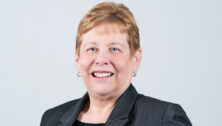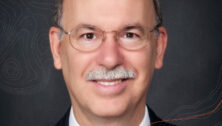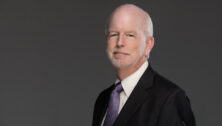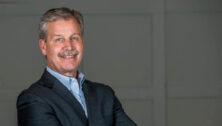Bucks County Leadership: Denise Lindsay, Executive Vice President and Chief Financial Officer, Meridian Bank
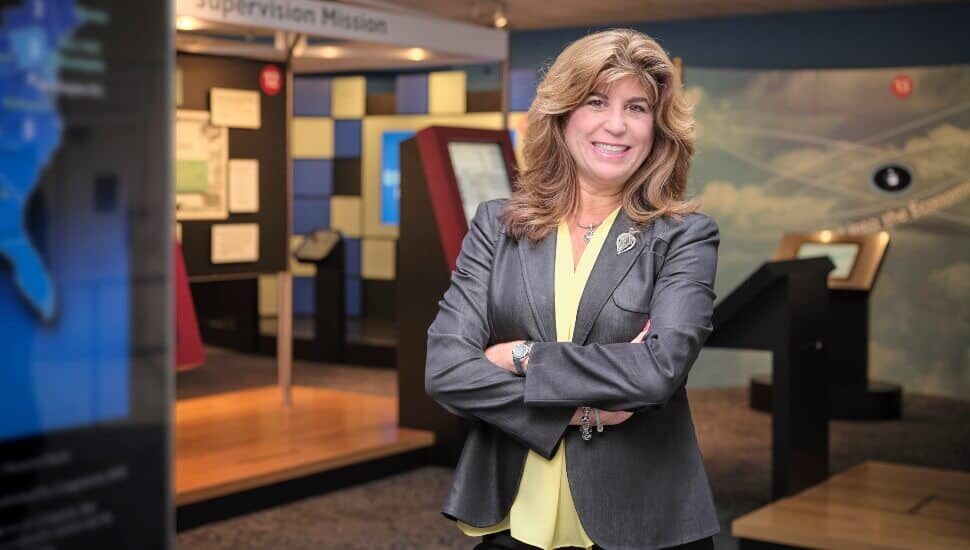

Denise Lindsay, Executive Vice President and Chief Financial Officer at Meridian Bank, spoke with VISTA Today about growing up in Carmel, N.Y., her love of sports and her close-knit Italian family that gathered for Sunday dinner every week.
Lindsay also discussed her first job at a bank as a teenager and how Villanova University’s internship program led to career opportunities that brought her to where she is today. And she shared her efforts to get more young people into the banking industry and talked about the mentors who opened doors for her.
Where were you born and where did you grow up?
I was born the youngest of two children in Carmel, New York. It’s about an hour north of New York City. It was a very similar suburban experience to where we are now and where my kids grew up in relation to Philadelphia.
What did your parents do?
My father was in construction by trade. Then he had an opportunity to buy a building and start his own business designing and installing custom kitchens. He
worked day and night to make a success of his business and that building. My mom ran the paint and wallpaper sections. They had this nice little mom-and-pop shop.
What do you remember about growing up in Carmel?
My parents were both born and raised in or near New York City, so they had a lot of friends and relatives in the area. There are two things I remember the most. We would go into the city for visiting, entertaining, eating, shows, theater, and sporting events. We did a lot of that.
The other thing that’s noteworthy, because today’s times are so different, is that I lived close to pretty much my whole extended family. They all lived within 20 minutes of us. I’m Italian by background, and my mom had everybody over for dinner nearly every Sunday of my childhood.
Did you play any sports while you were growing up?
I played a lot of soccer, travel and varsity. I also played volleyball. I love every sport. I’m a big sports fan.
What sport were you best at, Denise?
I was pretty good at both, but I was best at soccer. I was first string varsity all four years of highschool and was captain my senior year, all-county, that whole hoo-ha.
Did you play soccer in college?
I did not play in college. I hurt my right foot at the tail end of my season senior year. In college, I was focused on academics. I did House Council for two years there, which involved running the dorm activities ..
What did you bring to the field that was different, and why did everybody look to you as a leader?
Soccer – I coached soccer for a bunch of years with my kids.– It is a great team sport that anybody can play, especially when they’re younger, because you just have to run and kick the ball. As you get bigger, you learn plays and have to have some skill, but it’s a great way to get the kids out there, being a team. If you watch “Ted Lasso,” his coaching style is about teamwork and not about each individual, and that’s what I love about soccer. While I was leading, I was very collaborative and focused on motivating everybody together.
Was that the first experience in your life of true leadership?
I would say so.
How did you do with it?
I loved it. My teammates were very supportive, and we pumped each other up. Everybody’s got their own style. Some people need more praise, some need encouragement, and others need you to let them do their thing. You’ve got to learn all those styles. The most important thing about being a leader is knowing who you’re leading and how best to motivate them.
What jobs did you have while you were growing up?
Oh sure, everybody worked at my house. I had some easy jobs, like babysitting and clerical jobs. But my first real job was working at Mahopac National Bank, which was the town bank. I worked in the operations center at the bank starting when I was 16 or 17 and all the way through college on my breaks.
How did you land that job at 16 years old?
My parents had this business in the community and my mom was always on the lookout for clerical jobs for me. My parents had their business accounts at Mahopac and my mom knew the woman who ran the operations center. When I was old enough, they were looking for someone to help out part-time.
You only get a few good jobs when you’re that young. I ended up running the microfiche machine and doing a lot of subpoena research. The early parts of the job weren’t that great.
What lessons did you learn from those early jobs that still stay with you today?
That job was so important to me. First, I learned that I loved being in the community. You knew everybody walking in and out of that bank – that was when people used to actually go to the bank. I also liked the industry of banking. I liked finance, math, and numbers. As you can tell, that stayed with me.
Before we talk about that, let’s talk about music. What floated your boat music-wise?
My first eight-track was Van Halen. My high school years and early college were in the 80s, so I was listening to Journey and Foreigner and The Cars.
Did you have a favorite group?
Me – and the whole rest of the world in the 80s – loved Journey. I almost hate to admit it because it’s so cliche, but I loved them. We just went to see them this summer. It was a great show. We’ve seen some of these old bands try to come back and do their thing. Some of it’s not that great. Foreigner – there’s only one guy left and we don’t remember him. Styx was pretty good because they still had Tommy Shaw. Journey’s tough because they no longer have Steve Perry, but the singer they got to replace him sounds just like him. We were very, very impressed.
Where did you end up going to college and why there?
I went to Villanova, which is why I now live in Pennsylvania. It’s an interesting story. My brother went off to college in Buffalo at St. Bonaventure University and we felt like we shipped him out six hours west. We never saw him the whole time.
When it was my turn to pick a college, my mom sat me down, drew a circle around our house, and said, “Three-hour radius – that’s what you’ve got.” I picked one school in each state within a three-hour radius of our house.
My dad went to Villanova for a bit, really enjoyed it, and wanted to see it. I’d seen many others – I had my heart set on Providence College, so I wasn’t necessarily impressed that I was going to see Villanova – but the campus was everything I thought a college campus should look like.
When we talked to the folks in admissions, they outlined their internship program in accounting and the accolades of the business school. None of the other schools I looked at had that same internship program, and I was dead set on getting an internship out of this college experience. They sold me. Their business school was fantastic for me, and it’s still a fantastic school.
Looking back, was Villanova a good choice for you?
It was great. And I’ll tell you a little secret about me. I did their internship program and interviewed with all of the Big 8. I picked KPMG and did my internship there. After I graduated, I got a job at KPMG. I was there for several years, earned my CPA and then took a job at Downingtown National Bank. They were a client of mine – I got hired out from under the audit. I worked there for 12 years and then was referred to Meridian. And the secret, if you didn’t catch it, is that after I got that internship, I never applied for another job ever again. That’s a testament to what a strong program that was.
Looking back over your career, who were the people who saw promise in you and opened up doors?
Sadly, I don’t remember because, in public accounting, you go from job to job to job and have different managers all the time. But I did have one great manager named DickCarlin. He left KPMG and went to Zelenkofske Axelrod in Bucks County. He was a great mentor. He gave me the opportunity to run jobs at KMPG at a staff level. He knew I could do it, knew I could handle it.
What did Dick see in you?
I think two things. One, aside from being a hard worker, was that I was a fast learner. Two, I had some initiative. I had some gumption. We lost the senior on the job in my second year, and I told him, “Do not bring in someone over me because I’m going to have to teach them this whole engagement. I can do this job.” He looked at me and said, “I’m going to give you that shot.” That was a good experience.
Were there others like him across your career?
I was there for several years and then took a job at DNB. Hank Thorn was DNB’s CEO, and Bruce Moroney was the CFO. I worked with both for 12 years Bruce and I had a good working relationship. My role there was controller. He promoted me to vice president right away– there wasn’t much more for him to do after that. I really enjoyed that working relationship.
So, what brought you to Meridian?
That is the funniest story. I was not looking for Meridian. I was at Downingtown and a friend of mine referred my name to Chris Annas. He gave me a call out of the blue. I didn’t know who he was or what he was selling – I thought he was a salesperson. Chris asked me if I would be interested in working on a startup. And this is one of my life’s lessons – you’ve got to take a risk. When you have an opportunity, you can’t be afraid to take it. With that mindset, I said, “I would love to talk to you about it.” I had no desire in leaving my job.
But it was just so interesting to me – to start a bank. I thought I needed to talk to this man and find out what that was about. It turns out my coworker from KPMG, John Depman, referred me, knowing that I might not get much further at DNB because my predecessor was only eight or nine years older than me, so he would be there a long time. John thought I would be up for the challenge.
I’ve been at Meridian since 2004, since the very beginning. I signed on April 1, and we opened the doors in July.
We’re at the end of 2022, approaching 2023. What are the challenges and opportunities that you’re working on?
Banking is very challenging right now. I’m sure every banker is worried about where the rates are going and how that’s going to affect the balance sheet. But, on a more personal level, I’m more focused on getting the word out to young people about banking.
We had this whole COVID environment with the Paycheck Protection Program, which reminded the community how a true community bank supports them. After the last crisis, banking was a dirty word. Now, all of a sudden, they’re going to their community banker, and we’re helping them. But we’ve always been here and we’ve always been helping them.
I’m focused on getting young people excited about a career in banking. I was lucky enough to have that focus from a young age, in high school, and I loved every minute of it. It’s so rewarding. And challenging – it definitely has its challenges.
What are you doing to reach the new generation of future bankers?
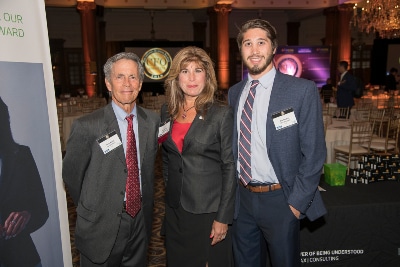
There are several things that I’m involved in – Pennsylvania Bankers Association and Women in Banking. My job is to bring young women in my organization there, expose them, get them training and make sure I’m mentoring them.
We have a great mentoring climate here at Meridian. We have an extensive internship program that we kept up even during COVID, which was hard. But it’s that important to us. That’s something I benefitted from in my career and I want to keep that going and pay it forward.
Anything else you’re working on that’s noteworthy? Would you like to run your own bank someday?
I’ve already formed a bank, so I’m not sure that I want to form another one. But I certainly have enjoyed running this one with Chris. It’s been phenomenal. We’re a $2 billion bank now and expanded regionally to Delaware, Maryland and Florida. .
So, tell me, Denise, what do you do with all your free time?
Well, it’s funny that I have free time now after coaching and Girl Scouts and Boy Scouts. I’m still a sports watcher. I play tennis – three days a week, if I’m lucky. I keep trying golf. My dad taught me how to play golf in my 20s, and I was much better back then when I had more time to play. I could focus on that a little more and give it a little more time. I’m definitely sports-minded and I like to cook and read.
And I visit my kids. My kids are all over. My son works for KBR in Houston. Right now, he’s on a rotation in London, so we’re going to London next month. My daughter lives and works in Boston, and travels extensively in her time off. We visit her there and occasionally wherever she is off to!
You said you like to read – what kind of books do you like?
I like historical fiction. Right now, I’m reading a book called “Surviving Savannah.” It’s about a ship that sank outside of Savannah, Georgia. It’s one of those books that talks about a character now and then talks about a character eons ago and how their stories collide, which I love. I love to read books that talk about the history of a place I don’t know that well.
In this chaotic world, Denise, what keeps you hopeful and optimistic?
For nine years I was on the Board of Advisors for the Upper Main Line YMCA, the last 2 years as Chair. That experience for me was very rewarding. To be involved in the great programs they have for our diverse community, especially for families, reminded me of the important need for people to come together and support each other. Witnessing small and big moments of joy and good works from caring people, keeps me hopeful and optimistic.
Finally, Denise, what is the best piece of advice you ever received?
The best piece of advice I ever received, and often repeat, is that you should work hard, be open to change, and be ready to take opportunities when they come – values instilled by my parents. If it was not for that advice, I may not have taken Chris’ call about Meridian. But… I was open to learning about the opportunity and ultimately I took the chance on a start-up
Connect With Your Community
Subscribe for stories that matter!
"*" indicates required fields


























